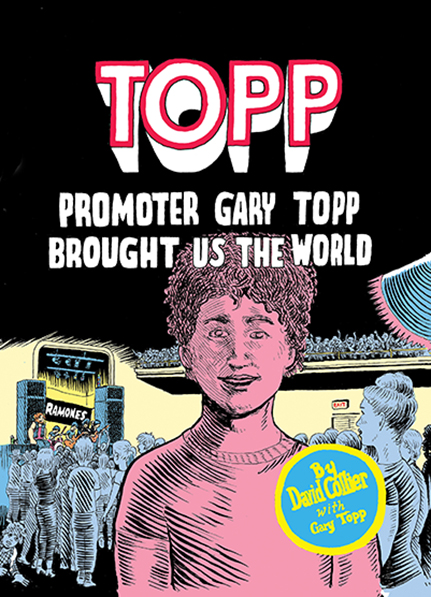
Topp: Promoter Gary Topp Brought Us the World
David Collier, 142 pgs, Conundrum Press, conundrumpress.com, $20
Eulogies to the early punk era are here, right on time. The same brash youth who once endured shouts enjoining them to get a job, haircut, or life, now do the screaming from the rocking chair on the front porch. Veteran comix artist David Collier offers one such bitter-sweet nostalgic tribute in Topp, a biography of legendary Toronto promoter Gary Topp. Along with his business partner, Gary Cormir, Topp nurtured Toronto’s alternative music and film scenes in the 70s and 80s and gained a cult following. Woven in is Collier’s own coming-of-age story, who worked for Topp as greenhorn Busboy Dave, giving the book that eyewitness credibility.
Collier knows just how much beer-splattered patina will immerse the reader in time and place, right down to a “No Drinks’’ sign taped on the sound guy’s mixing board.
Interviews and site visits round out the research, and Collier includes reproductions of archival materials galore. Doubtlessly, Topp is an important historical record that will be appreciated by ex-punks and scholars alike.
Instead of a continuous narrative, each page is a self-contained, six-panel reminiscence on an individual topic, such as a snapshot of Dave “Dave Rave” MacIntosh and Nancy Lanthier printing Toronto’s Nerve magazine. Because memories and current events are montaged, dreamlike, it would have been nice to have key events summarized in a timeline at the end or some more explanatory text.
There is a controversial page titled “Punk” where Collier tries to contextualize swastikas as fashion statements. “Nobody in those days ever dreamed that someday Nazis would again be taken seriously,” he writes. “Punk wasn’t particularly political then.” Does Collier not remember “Nazi Punks Fuck Off,” recorded by the Dead Kennedys in 1981? Did Toronto punks not attend protests or take a righteous stand against Thatcher- Reagan hegemony? What about the war between racist and anti-racist punks for the claim to skinhead identity? Shock value is political, particularly so. Alas.
Despite being decidedly more gentle than other documentaries of the same period might be, this book is liberally sprinkled with realism, hardcore personalities, and winking Canadiana references — a damn fun read for late Boomers and Gen-Xers with two chairs: one to curl up in, and another for those who like to rock. (Jaleen Grove)
